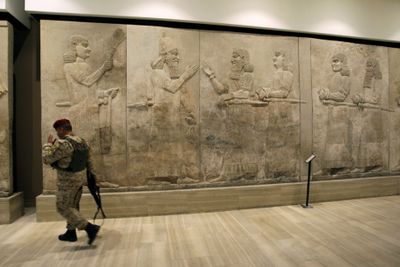Revived Iraqi museum reopens
Baghdad gallery returns after six years with many once-looted artifacts

BAGHDAD – Iraq’s restored National Museum reopened Monday with a red-carpet gala in the heart of Baghdad nearly six years after looters carried away priceless antiquities as American troops largely stood by in the chaos of the city’s fall to U.S. forces.
The ransacking of the museum became a symbol for critics of Washington’s post-invasion strategy and its inability to maintain order as Saddam Hussein’s police and military unraveled.
But Iraq’s prime minister, Nouri al-Maliki, chose to look ahead. He called the reopening another milestone in Baghdad’s slow return to stability after years of bloodshed.
“It was a dark age that Iraq passed through,” the prime minister said at a dedication ceremony. “This spot of civilization has had its share of destruction.”
The museum – which holds artifacts from the Stone Age through the Babylonian, Assyrian and Islamic periods – will be open to the public starting today but only for organized tours at first, officials said.
“We have ended the black wind (of violence) and have started the reconstruction process,” al-Maliki told hundreds of officials and guardians of Iraq’s rich cultural heritage.
Once the home of one of the world’s leading collections of artifacts, the museum fell victim to armed thieves who rampaged through the capital after the Americans captured Baghdad in April 2003.
About 15,000 artifacts were stolen from the museum, and the lead U.S. investigator said last year that trafficking in those items helped finance al-Qaida in Iraq as well as Shiite militias.
Eventually, about 8,500 items were recovered in an international effort that included culture ministries across the region, Interpol, museum curators and auction houses. Jordan, Syria and Egypt were among countries that returned stolen objects to Baghdad, the scientific and literary hub of the Arab world in the eighth and ninth centuries.
The most valuable and unique pieces belonging to the collection, including two small winged bulls and statues from the Assyrian and Babylonian periods more than 2,000 years ago, were on display Monday.